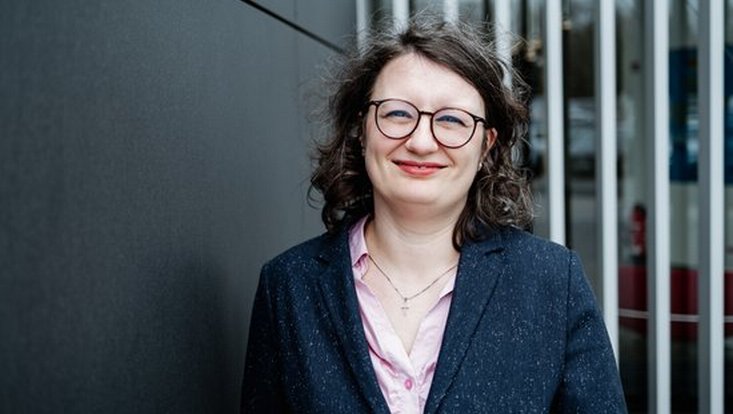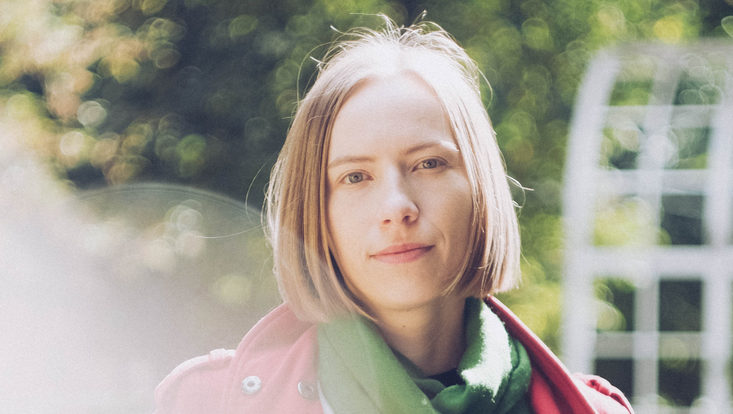Guest Professorship ‘Gender in Manuscript Cultures’
The guest professorship ‘Gender in Manuscript Cultures’ (run as ‘Women in Manuscript Cultures’ until 2023) is awarded every semester to a scholar whose work centers gender or other dimensions of diversity and inequity as a research topic or lens.
Both senior scholars and early career scholars can be nominated for the guest professorship. Guest professors ‘Gender in Manuscript Cultures’ provide role models and mentoring opportunities for Cluster researchers interested in developing research agendas centred on equity and diversity perspectives. Meanwhile, guest professors can join the Cluster’s Research Fields, establish collaborations with Cluster researchers, as well as draw on all of the resources available at our research facilities, including our artefact labs for the material analysis of written artefacts.
Guest professors receive a fellowship or monthly subsidy, as well as a ‘Gender in Manuscript Cultures’ Prize, and are invited to spend up to six months at the Cluster.
Nominations
Britta Frede (Universität Bayreuth)
Summer Semester 2025
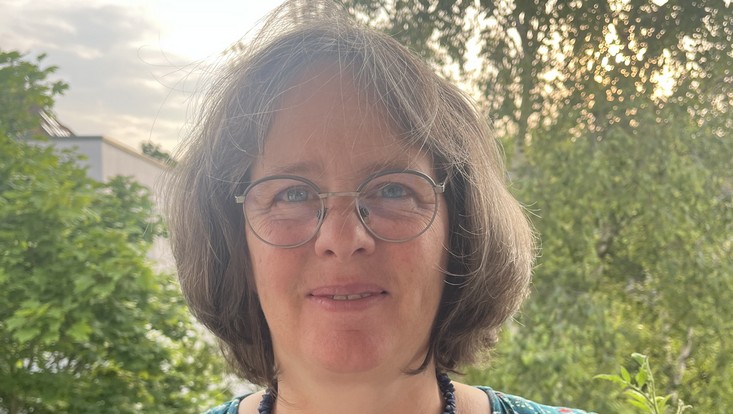
Since 2019, Britta Frede has been a researcher of Islamic Studies in the Africa Multiple Cluster of Excellence at the University of Bayreuth. From April 2022 to March 2025, she substituted for the Chair of Islamic Studies in Bayreuth. She has been involved in several research projects conducted at the Leibniz Centre of Oriental Studies (ZMO), the Berlin Graduate School for Muslim Cultures and Societies (BGSMCS), and Humboldt University, working on various aspects of Islam in Africa since 1800. She held fellowships at the African Studies Centre (ASC) in Leiden and the Institute for Humanities in Africa (HUMA) at Cape Town University. Her first book, Die Erneuerung der Tiǧānīya in Mauretanien: Popularisierung religiöser Ideen in der Kolonialzeit (Schwarz Verlag, 2014) won two research awards (Hedwig-Hintze-Frauenförderpreis (FU Berlin, 2013); Forschungspreis der Anne Marie Schimmel Stiftung (DMG/Sektion Islamwissenschaft, 2015)). Based on her multi-disciplinary background in Islamic Studies and African History, she has published several journal articles on Sufism, Islamic education, and Female authority in African Islamic scholarly culture. Since 2015, she has been part of the editorial board of the journal Islamic Africa (Brill). During her tenure at the CSMC, she will be working on a chapter of her second book project, which discusses the multiple and relational perspectives on Islamic scholarly culture that a reflection on women’s perspectives and the consideration of power can generate.
Interview
‘Information about Learned Women is Hidden in Texts about Male Scholars’
Gender in Manuscript Cultures Lecture
Why Should We be Interested in Women’s Contribution to Islamic Scholarly Culture?
1 July 2025, 6:15 pm – 8:00 pm
Islamic manuscript culture and scholarly culture have a long and ambiguous history. First, the question of what texts are supposed to be written down and second, who shall access the written texts, have been subject to negotiation. However, technological innovations, like script and later print, were accepted for most sorts of texts at different times. Nevertheless, for writing scholarly texts, manuscripts and scholarly culture are domains that have intertwined intricately since then. This lecture will direct the reader's attention to the Western Sahara region, focusing on the contributions of female authors and educators to Islamic knowledge production. The focus is on didactic texts and devotional literature as the primary genres of the scattered sources about women scholars. When measured quantitatively, their contribution is marginal. Nevertheless, the research presented is meant to complement the documentation of male activities and better understand the legacy of patriarchal hegemonies. First and foremost, the scarce traces of texts written, taught, and/or copied by female scholars invite us to reflect on the archive that local scholarly culture and, to a certain extent, academic research have created for documenting Saharan manuscript culture. This intervention's primary focus is on applying feminist theories to research domains within the humanities and cultural studies, which can facilitate a more nuanced comprehension of power dynamics in our research field. If we study manuscripts, we are amid social hegemonies at work, especially as they have to be considered knowledge work. Engaging with texts written by women and with their absence from archives and reference works raises questions about what we create in academic research and which research paradigms and blind spots are perpetuated, often without deliberate intention.
Maya Stiller (University of Kansas)
Winter Semester 2024/2025
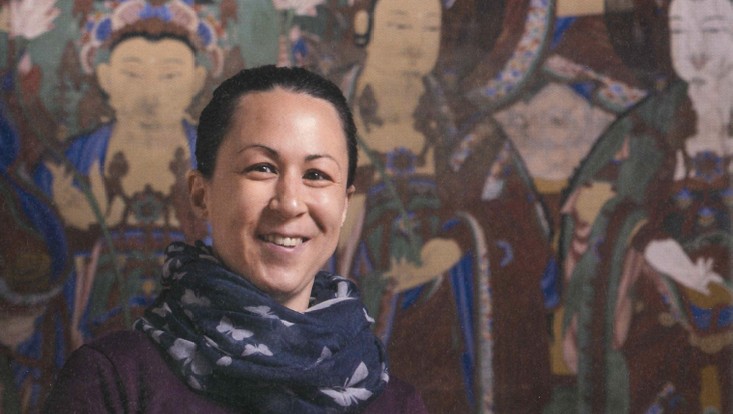
Maya Stiller is an Associate Professor of Korean art history & visual culture in the Art History Department at the University of Kansas. Prof. Stiller previously taught at Harvard University, Kyushu National University, Freie Universität Berlin, the University of Zurich, and the University of Vienna. With a double major in Korean Studies and Art History, she spent several years living and studying in Korea and Japan, followed by a doctorate in East Asian Art history from Freie Universität Berlin, and a Ph.D. in Buddhist Studies from UCLA in 2014. Her first book, Carving Status at Kŭmgangsan (University of Washington Press, 2021) won two book awards (American Historical Association 2022 Patricia Buckley Ebrey Prize and Association for Asian Studies 2024 James B. Palais Prize Honorable Mention). Based on her multi-disciplinary background in art history and Buddhist Studies she has published several journal articles on Korean Buddhist/Daoist art, Buddhist fundraising, and patronage networks. During her tenure at the Cluster she will be working on her second book project, which discusses the multi-layered cultural and religious context of Korean Buddhist architecture.
Interview
‘The Further Back in History You Go, the More Likely it is that Only Inscriptions Remain’
Gender in Manuscript Cultures Lecture
Inscriptions as Mirrors of Patronage: Gender and Spirituality in Korean Buddhist Temples
28 November 2024, 6:15 pm – 8:00 pm
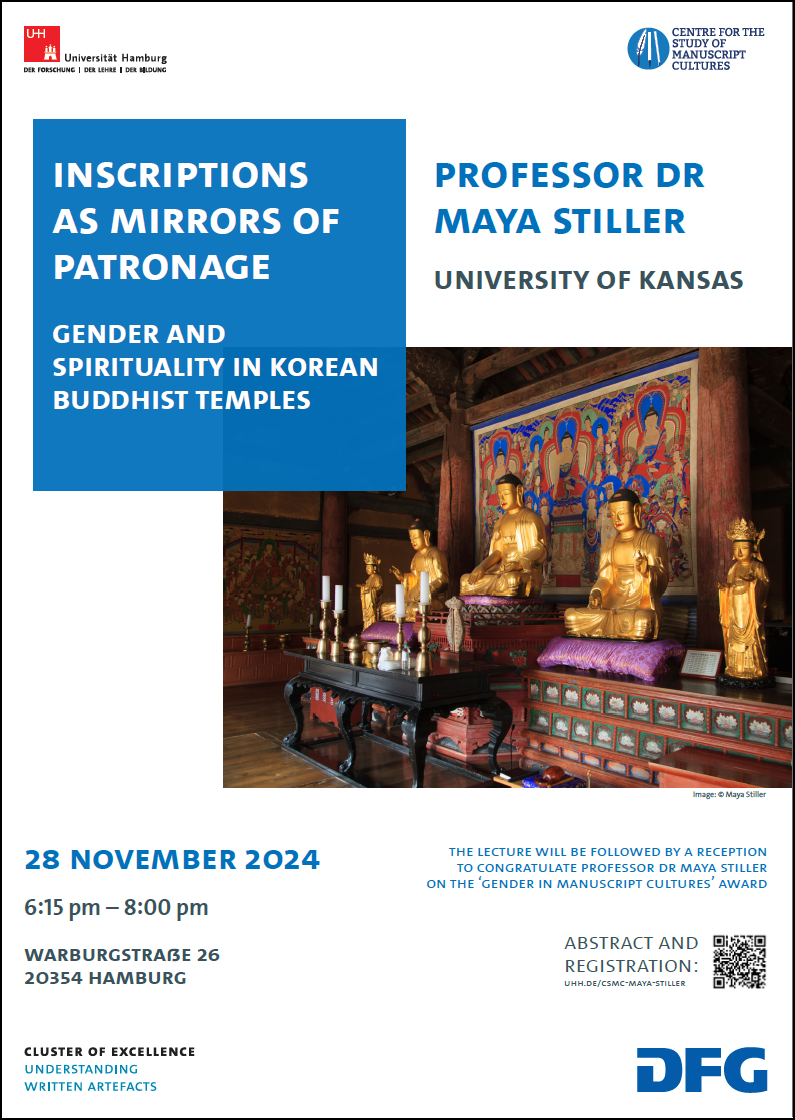
This lecture examines the multifaceted roles of inscriptions found in the interior of Korean Buddhist temples. Written in literary Sinitic and Siddham script, these inscriptions conveyed religious teachings, reinforced the temple’s authority, and commemorated its patrons. As such, they serve as invaluable windows into the beliefs, aspirations, and motivations of those who created and supported these sacred spaces. The analysis reveals a diverse range of voices represented in these texts, including female members of the royal court, Buddhist monks, and local scholars, offering insights into the complex dynamics that shaped Korean Buddhist culture and society.
Suzanne Akbari (Institute for Advanced Studies, Princeton)
Summer Semester 2024

Suzanne Conklin Akbari is Professor of Medieval Studies at the Institute for Advanced Study in Princeton, New Jersey. Her books are on optics and allegory (Seeing Through the Veil) and European views of Islam and the Orient (Idols in the East); she has also edited volumes on travel literature, Mediterranean Studies, and somatic histories, plus the Open Access collections How We Write and How We Read. Her most recent publications are The Oxford Handbook of Chaucer (2020), co-edited with James Simpson, and Practices of Commentary: Medieval Traditions and Transmissions (special issue of The Medieval Globe 8.2 [2022]), co-edited with Amanda Goodman. Textiles in Manuscripts: A Local and Global History of the Book, co-edited with Melissa Moreton, will be published by De Gruyter in 2025. Akbari is currently co-Principal Investigator on the Mellon-funded project “Hidden Stories: New Approaches to the Local and Global History of the Book” (2023–26). She is especially interested in how living and working on Lenape land (“Lunaapahkiing” or “Lenapehokink”) inflects our academic research and the communities we form. A co-editor of the Norton Anthology of World Literature, Akbari co-hosts a literature podcast called “The Spouter-Inn.” Many of her publications can be found at: https://hdl.handle.net/20.500.12111/7827.
Interview
Understanding Books as Objects, Belongings, Relations
Gender in Manuscript Cultures Lecture
30 May 2024, 6:15 pm – 8:00 pm
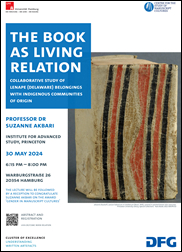
‘The Book and the Silk Roads’ project, now in its second funded phase under the title ‘Hidden Stories: New Approaches to the Local and Global History of the Book’, includes nine geographical areas of concentration, one of which is ‘Great Lakes and Eastern Woodlands’. This area is comprised of collaborative work on books and book-adjacent materials (e.g., land deeds, wampum) with Indigenous communities of origin, primarily members of Lunaape (Lenape or Delaware) tribal nations. While this research field is significant in itself, it also offers methodological insights concerning collaboration, relationality, and the status of the book that inform the ‘Hidden Stories’ project as a whole.
This lecture provides a methodological overview of our collaborative approach to Lunaape book history, addressing four case studies: 1) a European printed book, bound in a brain-tanned beaver-skin binding, painted in red and black and with a distinctive binding stitch; 2) manuscripts and printed books produced by both Indigenous and non-Indigenous members of Moravian communities, central to present-day Lunaape language revitalization; 3) deeds and other land-related documents, of value to present-day Lunaape historical work in support of land claims; 4) wampum associated with Munsee-speaking Lunaape communities currently held in museum collections in North America and Europe. These collaborations have also facilitated work in progress with Anishinaabe communities on a significant birchbark book, which will be described in brief.
Julia Bruch (Universität zu Köln)
Winter Semester 2023/2024
Julia Bruch has been a postdoctoral researcher at the DFG Research Training Group 2212 ‘Dynamics of Conventionality (400–1550)’ at the University of Cologne since 2020. In 2021/2022, She completed her habilitation at the Faculty of Philosophy at the University of Cologne, focusing on the theme ‘Craftsmen Writing History and Their Chronicles in the 15th and 16th Centuries’. She is currently working on a project on technical manuscripts and knowledge transfer. In the winter semester of 2022/23, she represented the Professorship for Medieval History/Focus on the Late Middle Ages in Cologne.
From 2011 to 2020, she worked as a research assistant at the Chair of Medieval History/Focus on the Late Middle Ages under Professor Dr Sabine von Heusinger. From 2009 to 2011, she was a fellow of the Gerda Henkel Foundation, and in 2008 and 2010, she worked as a research assistant at the Chair of Medieval History at the University of Mannheim under Professor Dr Annette Kehnel. She received her doctorate in 2012 with a thesis on the Cistercian monastery Kaisheim and its daughter monasteries. Julia Bruch won the Doctoral Forum of the German Historians’ Conference in Berlin in 2010 with a poster presentation on this work.
Interview
‘We Have to Consider the Possibility of Female Scribes’
Gender in Manuscript Cultures Lecture
7 December 2023, 6:15 pm – 8:00 pm
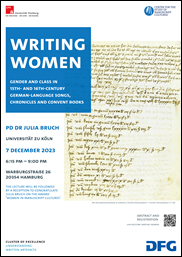
The paper deals with urban manuscripts written by women in German-speaking cities in the 15th and 16th centuries. The main objective of this study is to identify possible differences between these manuscripts and those written by men, paying particular attention to aspects such as writing style, social affiliation, and cultural influences. While the social milieu of the writer is recognized as an important factor, other variables related to the broader social context, such as language, access to writing materials, and the purpose of writing, also influence the characteristics of these manuscripts.
This research extends from a previously examined female brewer's chronicle as its foundational work and aims to broaden its scope to encompass a more extensive range of manuscripts created by women from various social strata, including artisans, merchants, patricians, and nuns. The objective is to ascertain whether women indeed cultivated distinctive manuscript designs or shared manuscript traditions with men within their respective social circles, potentially offering valuable insights into the identification of scribes in anonymous manuscripts.
Elena Chepel (Universität Wien)
Summer Semester 2023
After receiving her first degree in Classical Philology in Moscow, Elena completed her PhD in Classics at the University of Reading, UK, in 2016. Her first monograph Laughter for the Gods. Ritual in Old Comedy was published in the series on Greek religion Kernos Suppléments, Liège, 2020. She first started working on Greek papyri from Egypt in 2014 when she edited several fragments of Greek drama from the Oxyrhynchus collection in Oxford. As a postdoctoral research fellow at the Department of Ancient History, Papyrology, and Epigraphy at the University of Vienna, she studied documents from Late Antique Egypt in the Viennese Papyrus Collection and in the Louvre Museum, and led a research project on the history of Roman Memphis in papyrus sources, supported by the Austrian Science Fund. Since 2017, she has been a member of the CESRAS archaeological expedition in Deir el-Banat, Fayum, where she curated and studied cartonnages and papyri. She co-leads an international project ‘From the Nile to the Caucasus’ about the papyrus collection of G. Zereteli at the Georgian National Centre of Manuscripts in Tbilisi and prepares a volume of editions P. Zereteli I with new documentary and literary papyri from the Roman period.
Interview
‘The very act of submitting a petition is in fact empowering’
Gender in Manuscript Cultures Lecture
‘Women Creating Papyrus Documents: Authorship, Gender and Rhetoric’
1 June 2023, 6:15 pm – 8:00 pm
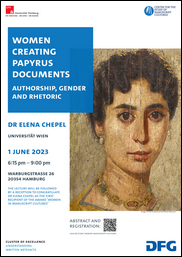
Papyrus documents – letters, petitions, and contracts – are unique sources from Greco-Roman Egypt that preserve women’s voices. These texts ‘speak’ in the female first person, narrating her story, expressing her emotions, stating her rights, or claiming justice for her. Although in a number of cases we can establish that the woman wrote or at least signed the document with her own hand, it was a common practice to hire a professional scribe and dictate him a text. For certain genres and contexts, such as filing a complaint, the scribe would also take an active and, perhaps, the leading role in composing the document since he knew the formulary and legal practice, and was educated in rhetorical techniques.
In this lecture, it will be attempted to reconstruct the process of writing petitions in which the plaintiff is a woman by exploring their material features, such as corrections of various stages of drafting a document, as well as by analysing the rhetorical features of the narrative. How is the woman presented in the document? What makes her story plausible and the complaint persuasive? What details are revealed about her emotional state? What claims are included? Answering these questions will help to understand to what extent women created the petitions that they submitted to the officials.

